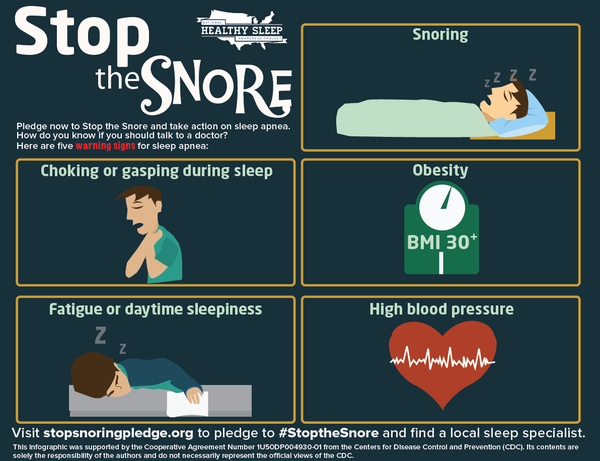Sleep apnea is a chronic sleep disorder that could be taking away from the quality of your life.
Characterized by pauses in breathing while sleeping up to hundreds of times a night, the chronic sleep disorder is estimated to affect the lives of at least 22 million adults in the U.S., according to the American Sleep Apnea Association. Unfortunately, 80% of people with moderate and severe cases of the sleep disorder go undiagnosed or untreated for years. Sleep apnea has been linked to serious health conditions including Type 2 diabetes, cardiovascular disease, stroke, obesity, high blood pressure and earlier death.
So what should you be on the look for in regards to yourself and family members? Check out these warning signs of sleep apnea provided by board-certified sleep physician and president of the American Academy of Sleep Medicine, Dr. Timothy Morgenthaler that we found on The Huffington Post:
Snoring: This often annoying habit is a very common symptom of sleep apnea. Although person who snores frequent may not have sleep apnea, it’s best not to ignore this warning sign and speak to a licensed physician just to be safe.
Daytime sleepiness or fatigue: The sleep disorder greatly diminishes sleep quality, leaving you tired and grogginess throughout your day no matter how long you’ve slept.
Obesity: Adults with a BMI (body mass index) of 30 or greater are considered to be obese, and the risk of developing sleep apnea increases as excess body weight increases.
Gasping or choking while sleeping: Snoring along with quiet pauses in breathing, and gasping for air while sleeping is a strong indicator that you may have OSA.
High blood pressure: About 1 in 3 adults, or 67 million Americans, have high blood pressure, with about 30-40% of these adults also having sleep apnea. Treating sleep apnea has been proven to effectively decrease blood pressure in plenty of patients.
Keep in mind that sleep apnea can affect people of any age, gender, weight or ethnicity, including infants and children. If two or more of these symptoms stand out to you, then there is a great chance that sleep apnea is present. Speak to a licensed physician or sleep specialist about your concerns, get tested and be on your way to a better quality of life with the treatment options available.


No comments yet.